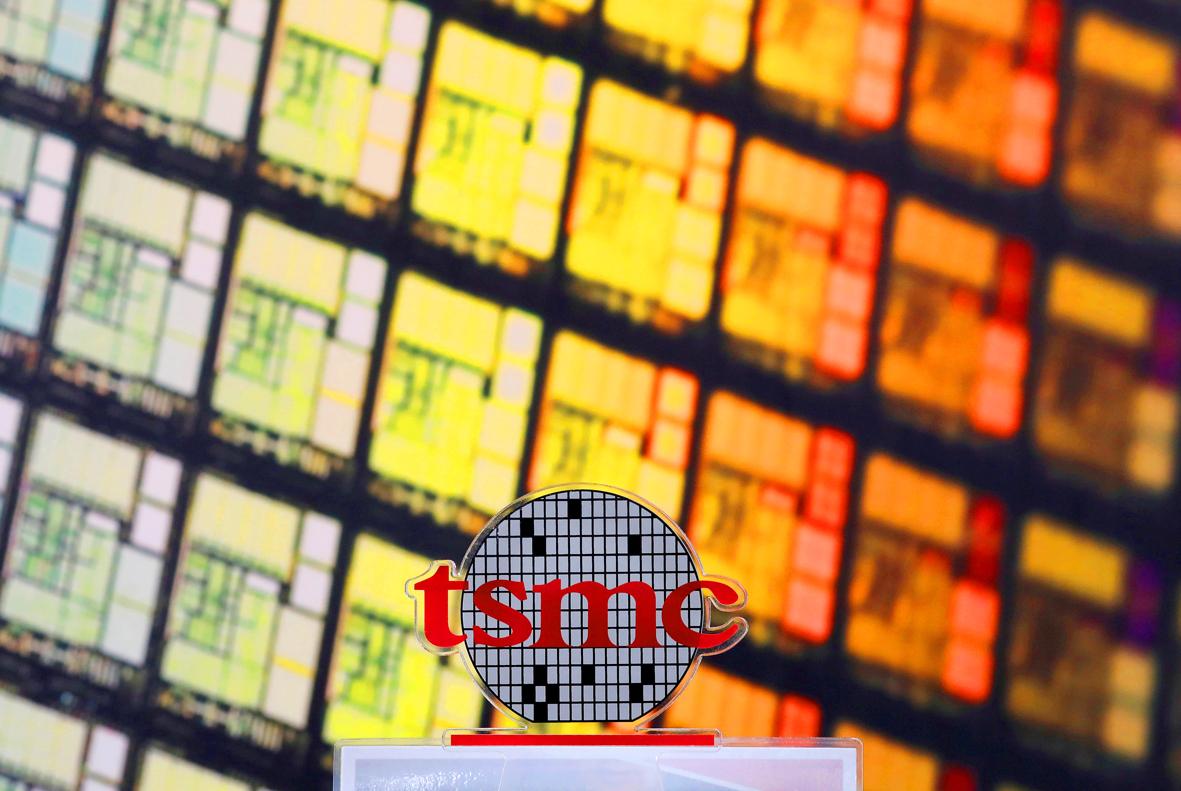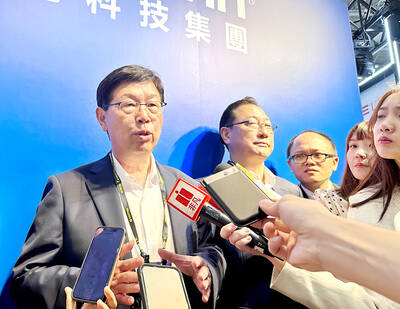Taiwan Semiconductor Manufacturing Co (TSMC, 台積電), the world’s largest contract chipmaker, said it plans to raise NT$21.6 billion (US$716.2 million) in a bond issuance to finance the construction of a new production site and further expand manufacturing capacity.
TSMC on Monday in a statement said that it would issue NT$21.6 billion of secured corporate bonds in three tranches: NT$5.9 billion of five-year bonds at a rate of 0.52 percent, NT$10.4 billion of seven-year bonds at 0.58 percent and NT$5.3 billion of 10-year bonds at 0.6 percent.
MasterLink Securities Co (元富證券) is the lead underwriter for the sale, TSMC said.

Photo: Reuters
The chipmaker did not say when the bonds would be issued, but there is speculation that it could be by the end of this month.
Proceeds from the sale would be used to finance the firm’s development of advanced 5-nanometer and 3-nanometer processes at its facility in the Southern Taiwan Science Park (南部科學園區), analysts said.
The company mass produces 7nm chips, but expects to start the mass production of 5-nanometer chips in the first half of this year and 3-nanometer chips in 2022.
The planned bond issuance would be TSMC’s second of this year, after it issued NT$24 billion in unsecured bonds last month.
TSMC’s board of directors in February approved a proposal to offer up to NT$60 billion in unsecured bonds in Taiwan, its largest corporate bond issuance in six years, which means that the firm could issue an additional NT$14.4 billion of bonds.
The company is one local firm that took advantage of rate cuts worldwide, sparked by concern over the effects of the COVID-19 pandemic on the global economy, to lower its fundraising costs, analysts said.
The interest rate on the planned bond issuance is 0.06 percentage points lower than on last month’s issuance, analysts said, adding that the 0.52 percent rate on the tranche of five-year bonds is the lowest among private companies that have sought to raise funds in Taiwan over the past few years.
At an investors’ conference in January, TSMC said that it expected to raise its capital expenditure for this year from a record US$15 billion to US$16 billion — 80 percent of which would go toward developing 3-nanometer, 5-nanometer and 7-nanometer technology.
Of the remaining 20 percent, 10 percent would be used to develop better packaging and testing technology, and 10 percent would be used to develop processes to enable the firm to maintain its competitive edge, TSMC said.

Taiwan Transport and Storage Corp (TTS, 台灣通運倉儲) yesterday unveiled its first electric tractor unit — manufactured by Volvo Trucks — in a ceremony in Taipei, and said the unit would soon be used to transport cement produced by Taiwan Cement Corp (TCC, 台灣水泥). Both TTS and TCC belong to TCC International Holdings Ltd (台泥國際集團). With the electric tractor unit, the Taipei-based cement firm would become the first in Taiwan to use electric vehicles to transport construction materials. TTS chairman Koo Kung-yi (辜公怡), Volvo Trucks vice president of sales and marketing Johan Selven, TCC president Roman Cheng (程耀輝) and Taikoo Motors Group

Among the rows of vibrators, rubber torsos and leather harnesses at a Chinese sex toys exhibition in Shanghai this weekend, the beginnings of an artificial intelligence (AI)-driven shift in the industry quietly pulsed. China manufactures about 70 percent of the world’s sex toys, most of it the “hardware” on display at the fair — whether that be technicolor tentacled dildos or hyper-realistic personalized silicone dolls. Yet smart toys have been rising in popularity for some time. Many major European and US brands already offer tech-enhanced products that can enable long-distance love, monitor well-being and even bring people one step closer to

RECORD-BREAKING: TSMC’s net profit last quarter beat market expectations by expanding 8.9% and it was the best first-quarter profit in the chipmaker’s history Taiwan Semiconductor Manufacturing Co (TSMC, 台積電), which counts Nvidia Corp as a key customer, yesterday said that artificial intelligence (AI) server chip revenue is set to more than double this year from last year amid rising demand. The chipmaker expects the growth momentum to continue in the next five years with an annual compound growth rate of 50 percent, TSMC chief executive officer C.C. Wei (魏哲家) told investors yesterday. By 2028, AI chips’ contribution to revenue would climb to about 20 percent from a percentage in the low teens, Wei said. “Almost all the AI innovators are working with TSMC to address the

FUTURE PLANS: Although the electric vehicle market is getting more competitive, Hon Hai would stick to its goal of seizing a 5 percent share globally, Young Liu said Hon Hai Precision Industry Co (鴻海精密), a major iPhone assembler and supplier of artificial intelligence (AI) servers powered by Nvidia Corp’s chips, yesterday said it has introduced a rotating chief executive structure as part of the company’s efforts to cultivate future leaders and to enhance corporate governance. The 50-year-old contract electronics maker reported sizable revenue of NT$6.16 trillion (US$189.67 billion) last year. Hon Hai, also known as Foxconn Technology Group (富士康科技集團), has been under the control of one man almost since its inception. A rotating CEO system is a rarity among Taiwanese businesses. Hon Hai has given leaders of the company’s six